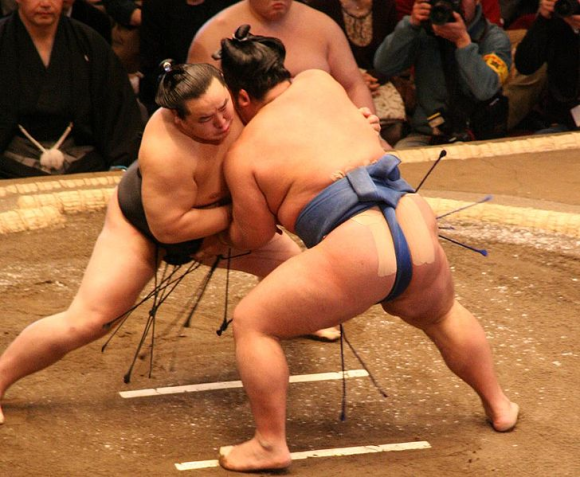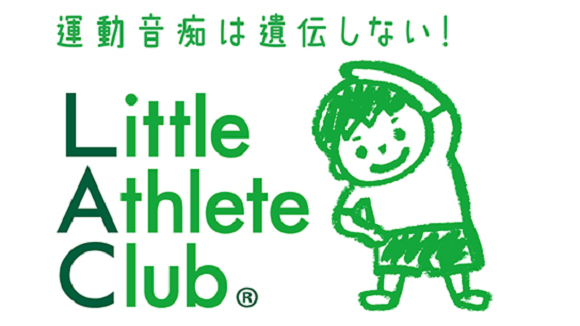
Remember when you were a little kid, and your parents would take you to the park to play? Not only were you having fun, you were developing important motor skills as you ran around, did somersaults, and swung on the monkey bars. Maybe when you got a little older and more coordinated, you’d even play catch with your mom and dad.
But did your parents love you enough to have a couple of sumo bouts against you?
Much like with mental development, the early years of a child’s life are critical in fostering the fundamental skills that underlie athletic ability. This principle has been espoused for years by fitness experts, including Kenta Toyama.
A graduate of Washington State University in the U.S., Toyama developed the programs at Little Athlete Club, a Japanese provider of children’s athletic programs. “There are individual differences as to the most important time for developing motor skills,” Toyama explains, “but the critical period is until around six years old, because the development of the nervous system at that young age is remarkable.”
Toyama isn’t suggesting that parents start training their kids to play a specific sport that early, though. Instead, he asserts that it’s important for children to do a wide variety of movements in order to develop as many related neural circuits as possible. That variety is the important thing, and it’s not necessary to push children past the level of intensity where they’re having fun playing.
Among the activities Toyama recommends is catching and throwing a ball, as the latter in particular involves a surprisingly complex series of coordinated muscle movements. Playing on the jungle gym is also a great choice, and as long as your toddler isn’t too heavy yet, the trainer also says there are benefits to getting down on all fours and letting your child ride you like a horse, which will foster good balance and posture.
“What I recommend the most, though,” he says, “is pretending to sumo wrestle.”
It’s unlikely that Toyama is actually advocating slapping your kid in the face and throwing him down in the dirt so much as playfully imitating the techniques of Japan’s massive fighters. He’s serious about the value of doing so, however. “Through sumo, children can learn many different skills, such as pushing, pulling, throwing, grabbing, and applying force and relaxing their muscles.”
Obviously, sumo is best done outside, unless your home happens to be big enough that you have space to set up a ring in your living room. But should your kids still manage to make a mess in the house, it turns out even that presents a developmental opportunity, since Toyama also has good things to say about having your kids help out with the housework. “By repeating the fundamental movements in cleaning floors or washing dishes, children’s’ manual dexterity, balance, and skill at handling tools are all refined, and their ability to concentrate is improved as well.”
Besides, if your kids develop a love of sumo that extends to the eating habits of the sport’s stars, you’re going to have way too many dishes to wash by yourself.
Related: Little Athlete Club
Source: Yahoo! Japan/R25
Top image: Wikipedia/Arcimboldo
Insert image: Little Athlete Club,


 Sumo wrestler vs. 16-month-old toddler: The cutest match you’ll ever see【Video】
Sumo wrestler vs. 16-month-old toddler: The cutest match you’ll ever see【Video】 High school students rapidly losing interest in sumo teams because too “painful,” “scary,” and “naked”
High school students rapidly losing interest in sumo teams because too “painful,” “scary,” and “naked” Robot sumo wrestlers fire laser blasts in crazy, free-to-play horse racing browser game
Robot sumo wrestlers fire laser blasts in crazy, free-to-play horse racing browser game Japanese prefectural government passes video game ban limiting kids’ daily play, smartphone time
Japanese prefectural government passes video game ban limiting kids’ daily play, smartphone time Japanese educators call for twice monthly No Video Game Days, recommend kids go fishing
Japanese educators call for twice monthly No Video Game Days, recommend kids go fishing Starbucks Japan unveils new sakura cherry blossom collection for hanami season 2026
Starbucks Japan unveils new sakura cherry blossom collection for hanami season 2026 The best Hobonichi diaries, covers and stationery for 2026
The best Hobonichi diaries, covers and stationery for 2026 Is Tokyo Station’s startlingly expensive wagyu bento boxed lunch worth its high price?[Taste test]
Is Tokyo Station’s startlingly expensive wagyu bento boxed lunch worth its high price?[Taste test] Sakura Festival in Chiyoda mixes illuminations, boats, music, and Rilakkuma in the heart of Tokyo
Sakura Festival in Chiyoda mixes illuminations, boats, music, and Rilakkuma in the heart of Tokyo Starbucks Japan reveals new sakura cherry blossom drinkware range for 2020
Starbucks Japan reveals new sakura cherry blossom drinkware range for 2020 Which convenience store onigiri rice balls are the most popular? Survey reveals surprising results
Which convenience store onigiri rice balls are the most popular? Survey reveals surprising results Ichiran Ramen opens new premium branch in Ginza with high-class boxed noodles
Ichiran Ramen opens new premium branch in Ginza with high-class boxed noodles Ramen made by a sauna shop opens its doors in Tokyo
Ramen made by a sauna shop opens its doors in Tokyo Japan Extreme Budget Travel! A trip from Tokyo to Izumo for just 30,000 yen [Part 2]
Japan Extreme Budget Travel! A trip from Tokyo to Izumo for just 30,000 yen [Part 2] Hana Komon: Japan’s beautiful, samurai-style floral birthday crests
Hana Komon: Japan’s beautiful, samurai-style floral birthday crests Starbucks Japan releases first-ever Hinamatsuri Girls’ Day Frappuccino
Starbucks Japan releases first-ever Hinamatsuri Girls’ Day Frappuccino Japanese restaurant chain serves Dragon Ball donuts and Senzu Beans this spring
Japanese restaurant chain serves Dragon Ball donuts and Senzu Beans this spring Japan Extreme Budget Travel! A trip from Tokyo to Izumo for just 30,000 yen [Part 1]
Japan Extreme Budget Travel! A trip from Tokyo to Izumo for just 30,000 yen [Part 1] Highest Starbucks in Japan set to open this spring in the Tokyo sky
Highest Starbucks in Japan set to open this spring in the Tokyo sky Japan’s craziest burger chain takes menchi katsu to new extreme levels
Japan’s craziest burger chain takes menchi katsu to new extreme levels Japan has only one airport named after a samurai, so let’s check out Kochi Ryoma【Photos】
Japan has only one airport named after a samurai, so let’s check out Kochi Ryoma【Photos】 Japanese drugstore sells onigiri at pre-stupid era prices, but how do they compare to 7-Eleven?
Japanese drugstore sells onigiri at pre-stupid era prices, but how do they compare to 7-Eleven? Viral Japanese cheesecake from Osaka has a lesser known rival called Aunt Wanda
Viral Japanese cheesecake from Osaka has a lesser known rival called Aunt Wanda Japan’s newest Shinkansen has no seats…or passengers [Video]
Japan’s newest Shinkansen has no seats…or passengers [Video] Starbucks Japan releases new sakura goods and drinkware for cherry blossom season 2026
Starbucks Japan releases new sakura goods and drinkware for cherry blossom season 2026 Foreigners accounting for over 80 percent of off-course skiers needing rescue in Japan’s Hokkaido
Foreigners accounting for over 80 percent of off-course skiers needing rescue in Japan’s Hokkaido Super-salty pizza sends six kids to the hospital in Japan, linguistics blamed
Super-salty pizza sends six kids to the hospital in Japan, linguistics blamed Starbucks Japan unveils new sakura Frappuccino for cherry blossom season 2026
Starbucks Japan unveils new sakura Frappuccino for cherry blossom season 2026 Foreign tourists in Japan will get free Shinkansen tickets to promote regional tourism
Foreign tourists in Japan will get free Shinkansen tickets to promote regional tourism The 10 most annoying things foreign tourists do on Japanese trains, according to locals
The 10 most annoying things foreign tourists do on Japanese trains, according to locals Take a trip to Japan’s Dododo Land, the most irritating place on Earth
Take a trip to Japan’s Dododo Land, the most irritating place on Earth Naruto and Converse team up for new line of shinobi sneakers[Photos]
Naruto and Converse team up for new line of shinobi sneakers[Photos] Is China’s don’t-go-to-Japan warning affecting the lines at a popular Tokyo gyukatsu restaurant?
Is China’s don’t-go-to-Japan warning affecting the lines at a popular Tokyo gyukatsu restaurant? Survey asks foreign tourists what bothered them in Japan, more than half gave same answer
Survey asks foreign tourists what bothered them in Japan, more than half gave same answer Japan’s human washing machines will go on sale to general public, demos to be held in Tokyo
Japan’s human washing machines will go on sale to general public, demos to be held in Tokyo Starbucks Japan releases new drinkware and goods for Valentine’s Day
Starbucks Japan releases new drinkware and goods for Valentine’s Day We deeply regret going into this tunnel on our walk in the mountains of Japan
We deeply regret going into this tunnel on our walk in the mountains of Japan Studio Ghibli releases Kodama forest spirits from Princess Mononoke to light up your home
Studio Ghibli releases Kodama forest spirits from Princess Mononoke to light up your home Major Japanese hotel chain says reservations via overseas booking sites may not be valid
Major Japanese hotel chain says reservations via overseas booking sites may not be valid Put sesame oil in your coffee? Japanese maker says it’s the best way to start your day【Taste test】
Put sesame oil in your coffee? Japanese maker says it’s the best way to start your day【Taste test】 No more using real katana for tourism activities, Japan’s National Police Agency says
No more using real katana for tourism activities, Japan’s National Police Agency says Try Twitter-recommended Ring Fit Adventure for keeping your kids busy when everything is closed
Try Twitter-recommended Ring Fit Adventure for keeping your kids busy when everything is closed If you want your kids to go to elite universities, give them Legos, Japanese study says
If you want your kids to go to elite universities, give them Legos, Japanese study says Japanese college students discuss whether kids should be allowed to watch anime, play video games
Japanese college students discuss whether kids should be allowed to watch anime, play video games Amazing Japanese grade-schooler enters fast track to playing soccer for Real Madrid 【Videos】
Amazing Japanese grade-schooler enters fast track to playing soccer for Real Madrid 【Videos】 Majority of Japanese kids in survey almost never take a dump at school
Majority of Japanese kids in survey almost never take a dump at school “Why do I have to study?” Japanese educator’s answer to kids is half kind, half harsh, all wise
“Why do I have to study?” Japanese educator’s answer to kids is half kind, half harsh, all wise Japanese politicians want to set daily limit on how much time kids can spend playing video games
Japanese politicians want to set daily limit on how much time kids can spend playing video games Do some Japanese parents think of their kids like fighting Pokémon? Twitter wonders
Do some Japanese parents think of their kids like fighting Pokémon? Twitter wonders Genius Japanese dad designs T-shirt that tricks your kids into giving you a massage as they play
Genius Japanese dad designs T-shirt that tricks your kids into giving you a massage as they play Japanese sixth-grader calls out smartphone-loving parents over anti-video game lectures
Japanese sixth-grader calls out smartphone-loving parents over anti-video game lectures Japanese dad mercilessly beats son to tears in Smash Bros. after he says he wants to be pro gamer
Japanese dad mercilessly beats son to tears in Smash Bros. after he says he wants to be pro gamer Hands on with New Pokémon Snap! Is the Poké-photo game fun to play with your kids?
Hands on with New Pokémon Snap! Is the Poké-photo game fun to play with your kids? Three-year-old Japanese girl loves Grand Theft Auto, dad says it’s a great game for kids
Three-year-old Japanese girl loves Grand Theft Auto, dad says it’s a great game for kids Adorable judo girls still years away from making us scared, already able to make us smile
Adorable judo girls still years away from making us scared, already able to make us smile This Japanese schoolgirl loves anime, lollipops, and competitive pistol shooting【Video】
This Japanese schoolgirl loves anime, lollipops, and competitive pistol shooting【Video】